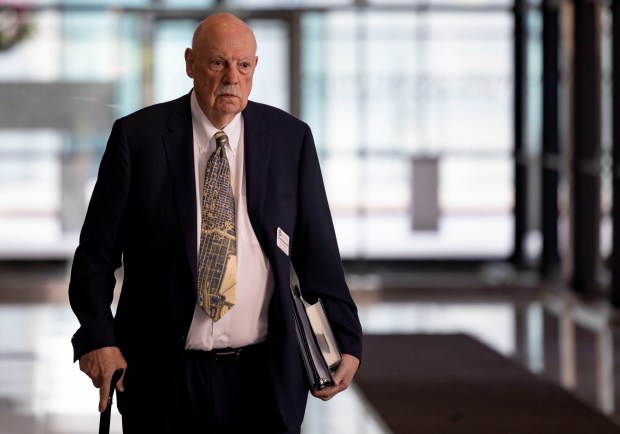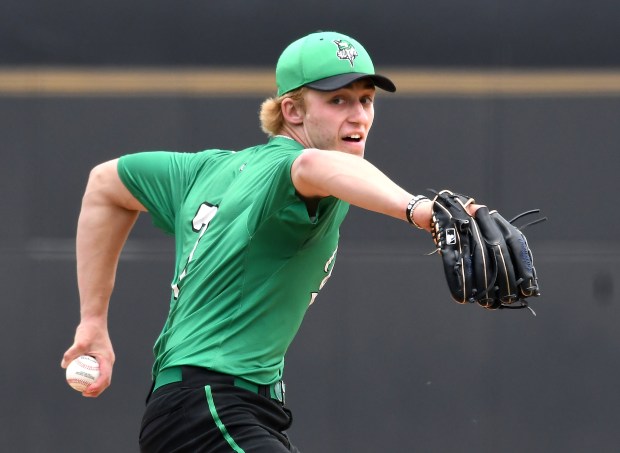Former Illinois House Speaker Michael Madigan was back in a federal courtroom Thursday to hear proposed expert testimony from a former Chicago alderman about the structure and importance of political operations like the one Madigan helmed during his record run in the state legislature.
Madigan’s attorneys asked a judge to bar Dick Simpson, a political science professor emeritus at the University of Illinois Chicago who served as the 44th Ward alderman in the 1970s, saying his opinions are not based on any scientific methodology and that he has a long history of bias against Madigan and the regular Democratic Party.
Meanwhile, with his racketeering trial rapidly approaching, Madigan’s attorneys also filed a lengthy list of other items they want to keep a jury from hearing. That included any evidence mentioning Madigan’s son, Andrew; wiretapped calls mentioning former Cook County Assessor Joseph Berrios; and a potentially damning recording where Madigan tells his confidant and co-defendant, Michael McClain, that some of his friends had “made out like bandits” with the contracts they’d landed for them.
The flurry of court activity comes as both sides are ramping up to the highly anticipated trial, which is scheduled to kick off Oct. 7 and will last up to three months.
A 148-page joint filing from prosecutors and the defense teams late Wednesday laid out the plethora of issues still to be decided over the next six weeks, from dozens of evidentiary disputes to crucial alterations in jury instruction language following a recent Supreme Court decision that affects what prosecutors must prove.
Madigan, 82, is charged in a 23-count indictment alleging he participated in an array of bribery and extortion schemes from 2011 to 2019 aimed at using the power of his public office for personal and political gain.
Also charged was McClain, 76, a former state legislator and lobbyist who was convicted last year of orchestrating an alleged bribery scheme by Commonwealth Edison. McClain’s sentencing in that case is pending.
In court Thursday, Madigan watched from a defense table as Simpson explained the sort of “Schoolhouse Rock” version of state and city politics his testimony would entail, saying he’d studied national and local politics for more than 55 years, authored some 13 books on the subject and worked on transition teams for several mayors, including Harold Washington and Lori Lightfoot.
Among the nuts-and-bolts detail Simpson testified to was the makeup of the ward system, how committeemen accumulated and maintained power, and how elected officials employed precinct captains to deliver votes and doled out patronage jobs as a reward for loyalty.
In his line of questioning, Madigan attorney Dan Collins poked at Simpson’s qualifications and resume, noting he had no specific knowledge of Madigan’s 13th Ward, which is far away from the North Side lakefront area Simpson represented.
The defense also attacked Simpson for the many critical statements he’s made over the years about Madigan.
“You have been interviewed in the media saying it was going to be a very good thing for the state when Mr. Madigan was out of office?” attorney Patrick Cotter, who represents McClain, asked at one point.
“I don’t remember that particular phrase,” Simpson replied.
Cotter followed up, asking whether it was true that “a significant part of your career has been premised on your public opposition to the Chicago regular Democratic Party?”
“Yes,” he answered.
In arguing for Simpson’s testimony, Assistant U.S Attorney Amarjeet Bhachu told U.S. District Judge John Robert Blakey it would provide key context to the jury on why Madigan would have taken steps “to reward those who work on his behalf in order to maintain power.”
Bhachu also said the testimony would help the jurors decode some of the recorded conversations they’ll hear, including one where McClain explains how the old-fashioned patronage system of giving meter-reader jobs to loyalists had given way to a more sophisticated system of funneling money to key people in the organization.
Last year, prosecutors wanted Simpson to describe the structure and operation of the Chicago machine to jurors in the “ComEd Four” trial of McClain and three former ComEd executives and lobbyists, but U.S. District Judge Harry Leinenweber decided to block Simpson from testifying, ruling it wouldn’t help the jury decide the facts at issue and could prejudice the defendants.
Blakey said he’d rule on the issue in Madigan’s case at a later date.
In their filing late Wednesday, meanwhile, defense attorneys asked Blakey to bar evidence related to Madigan’s son, insurance broker Andrew, saying it’s irrelevant to the charges “and only serves to drag a defendant’s family into the trial.”
Prosecutors have alleged the speaker at one point beseeched then-Chicago Ald. Daniel Solis for help getting Andrew Madigan business with the Resurrection Project, a Pilsen-based nonprofit that had received millions of dollars in state funds.
“Just ask him, give (Andrew) something. … Give him a chance to show what he, what he can do,” Madigan allegedly told Solis, who was secretly cooperating with investigators and recorded the conversation.
Other evidence in the investigation included a recording of Andrew Madigan talking with McClain about sweepstakes gaming legislation and donations made by AT&T to Aunt Martha’s, a community health and wellness organization where Andrew’s “significant other” was the executive director, according to the defense filing, which referred to Andrew only as a Madigan “relative.”
“Even if the evidence related to Madigan’s relative was marginally relevant, any probative value is significantly outweighed by the substantial risk of confusing the issues and wasting time,” the filing stated.
The defense made a similar argument when it comes to evidence that Berrios’ daughter Vanessa was recommended for a position with ComEd, arguing in the filing that the irrelevant testimony “would prejudice Madigan because Berrios is a well-known, although at times controversial, public figure throughout Cook County.”
The defense is also seeking to bar a recorded call between Madigan and McClain on Aug. 4, 2018, as the two were pushing for the execution of a labor agreement with ComEd, which they’d been arranging with ComEd Senior Vice President Fidel Marquez without the knowledge of the utility’s incoming CEO.
McClain noted in the conversation that they had a courier who was going to drive the agreement around to various parties to get it done. Madigan then asked, “But Mike, he’s involved with ComEd?”
“Yeah, remember we got him that contract, um, maybe five years ago now whenever it was?” McClain said on the recording, referring to payments of $150,000 to the contractor. “For a buck fifty a year.”
Madigan responded, “Mhm,” and laughed. “Some of these guys have made out like bandits, Mike,” Madigan said.
“Oh my God,” McClain said, coughing. “For very little work too.”
“Yeah,” Madigan said.
The specific arguments for why the call should be barred were filed under seal on Wednesday.




